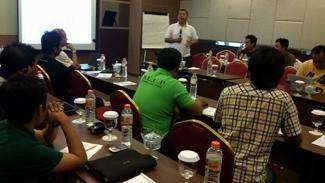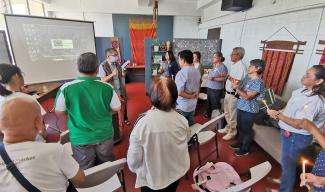On 27 May 2011, the Indonesian government launched the Masterplan for the Acceleration and Expansion of Indonesian Economic Development (MP3EI) with six economic regions (regional based development). The economic region of Sulawesi is one of the regions that have a development theme like; central production and processing of agricultural, plantation, fisheries, oil and gas and mining nationwide.
Since the enactment of Law No. 24/1992 on spatial planning, spatial planning policy has nowadays become a formal policy and is important in the management of land and other natural resources. Although there is no clear reference, the integration of land and natural resource management becomes an important requirement in setting a formal policy of spatial planning. Intervening in the contents of the spatial planning policy becomes a strategic advocacy issue in the future. Formal policy position of spatial planning is increasingly important with the issuance of Law No. 26/2007 on Spatial Planning.
That is why it is important to get a better understanding of spatial planning advocacy. As is done by Humaniora Kendari, in collaboration with Participatory Mapping Network (JKPP) and Samdhana Institute. On 16-19 October 2014 at the Hotel Horison Makassar an advocacy training on spatial planning was held and MP3EI was joined by 21 participants of Samdhana's partners from Sulawesi.
"We should have tried to come up with ideas on spatial planning in Sulawesi in our style, not the style of the government, nor any other style. And that is only possible if we have an opportunity together. But if what follows is for us only to become firefighters, then all will be the same. My prediction is that that NGO later will become the next government officer, " Tjatur Strong, facilitator of the training.
"Speaking of ideology, there is no spatial planning ideology in Indonesia. The ideology is the ideology of economic growth. MP3EI is an acceleration of the expansion of economic growth, if we do not understand economic growth, then what we are saying about advocacy is just talk. Economic growth is actually all about the numbers of money transactions, "explained Arif Wicaksono in the preface.
The control of land and natural resources form a long-term problem that must be faced by the people of Sulawesi. Because the design MP3EI create private opportunities for community land acquisition through infrastructure development spurred by Law No.2/2012 on the procurement of land for the development with a public interest. The impact felt by the community and local government of Sulawesi is a matter of policy synchronization, land conflict, economic domination by a group of investors, food security, employment and others.
"Related to permit large-scale plantations, initially in South Sulawesi, 5 million hectares of land is available for oil palm. Although it already exist in PTPN, there are a number of investments in South Sulawesi. Surely, if we learn from experience, exploitation of natural resources will occur. Support the MP3EI policy, in South Sulawesi smelters are already widespread, such as in the district Bantaeng where the material comes from North Sulawesi, " said Sardi Razak of AMAN South Sulawesi.
Spatial Advocacy Training activities and MP3EI are facilitated by Diarman (JKPP) and Mahir Takaka (PB AMAN) with spokepersons of BAPPEDA South Sulawesi, Arief Wicaksono (Samdhana) and Deni Rahadian (Coordinator JKPP). From this activity participants can improve their knowledge of spatial advocacy to a greater level. Because advocacy efforts are structured with a deep conceptual understanding it is much required in the future.




